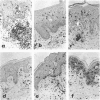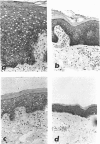Abstract
Lesional and non-lesional skin biopsies from patients with chronic plaque psoriasis receiving systemic cyclosporin A (CyA; 2.5 or 5 mg/kg(-1) per day) were examined for changes in T cell populations, Langerhans cells and the expression of interleukin-2 (IL-2) and epidermal growth factor receptors (EGFR) by immunohistochemistry. After 4 weeks of treatment a striking reduction in disease activity was observed, accompanied by a marked reduction in the numbers of CD4+ and CD8+ cells in the epidermis and dermis. As early as 7 days after initiation of treatment, a substantial reduction in the number of CD4+ lymphocytes in the dermis was detected. At the same time there was a significant reduction in the number of cells expressing IL-2 receptors (IL-2R); this was greater than the corresponding decrease in CD3+ cells, a finding that suggests that CyA may reduce the number of activated lymphocytes preferentially at this early stage of treatment. In contrast, the number of epidermal Langerhans cells increased within 1 week and more markedly by 4 weeks. The expression of EGFR on keratinocytes in all layers of the epidermis persisted during CyA treatment, despite resolution of the lesions. These results suggest that, rather than preventing keratinocyte hyperproliferation via interference with the expression of EGFR, the anti-psoriatic effects of CyA may be mediated, at least in part by interference with T cell activation evident within I week of instigation of therapy.
Full text
PDF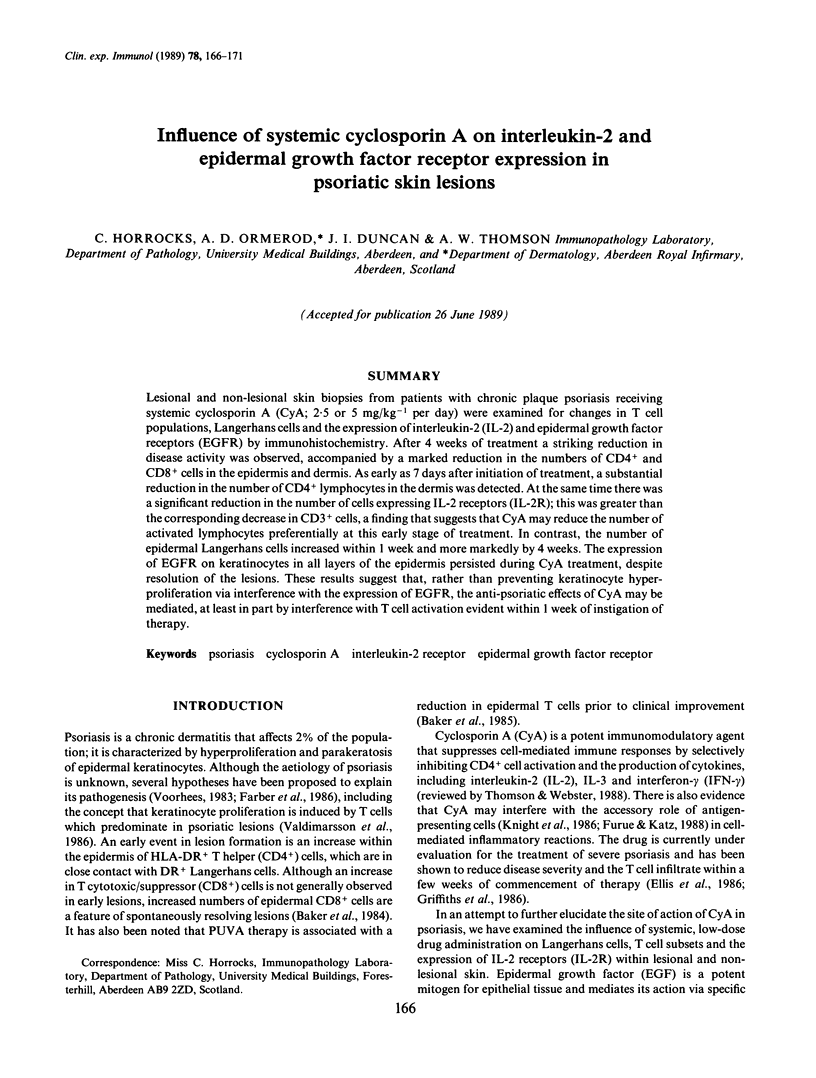
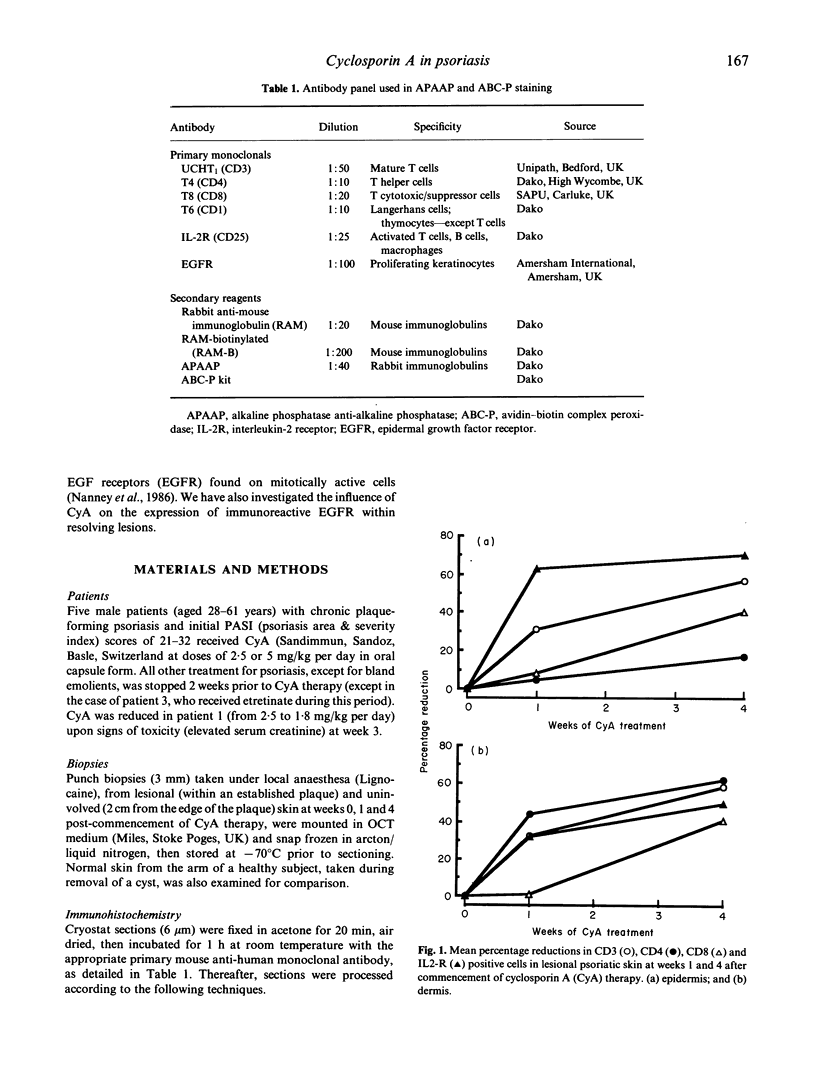
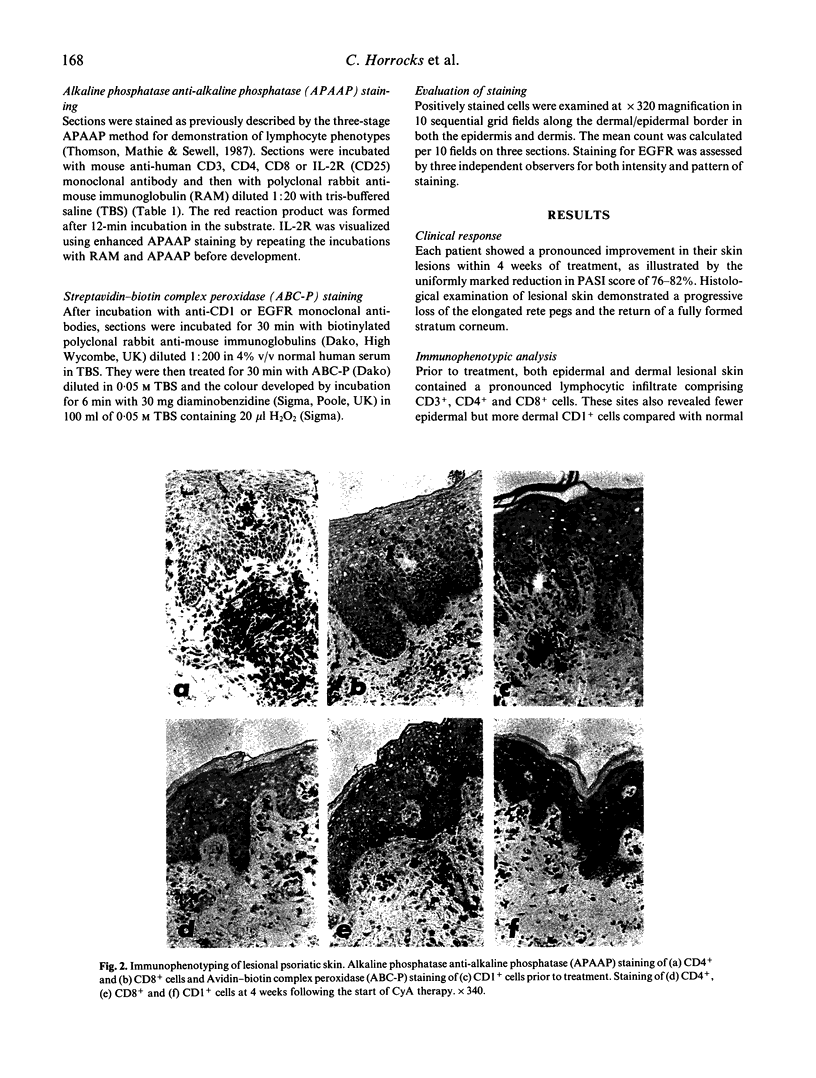
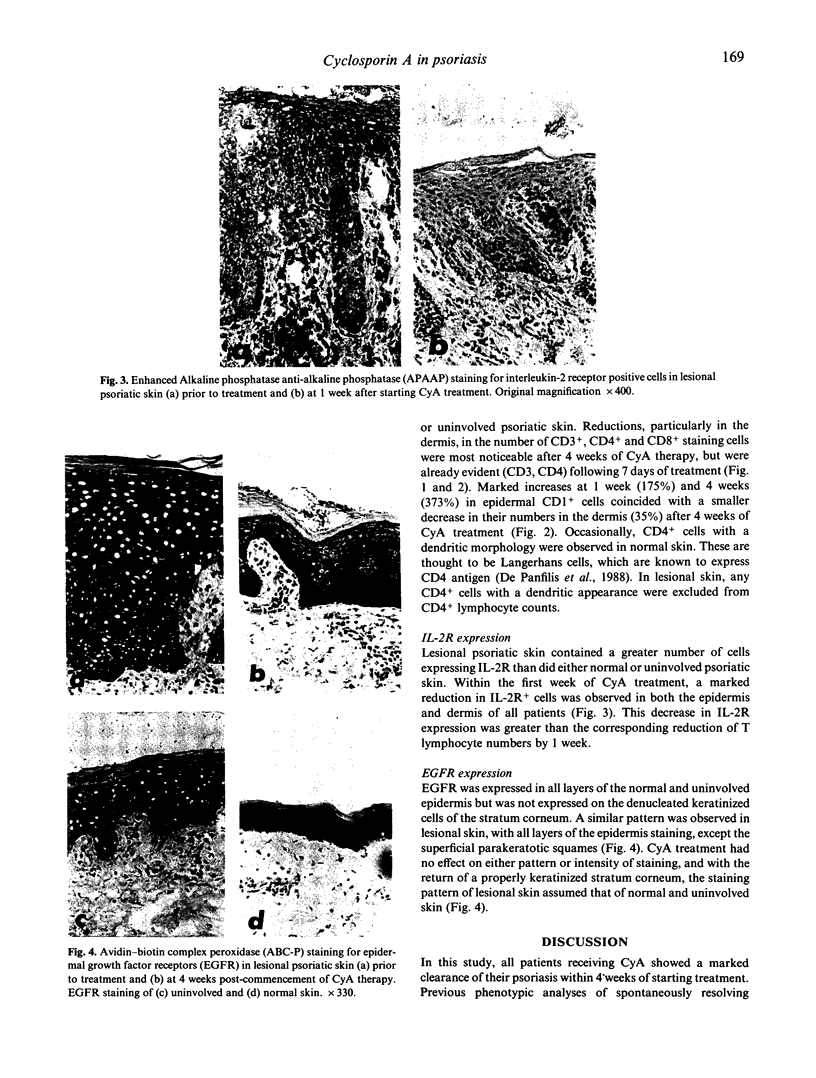
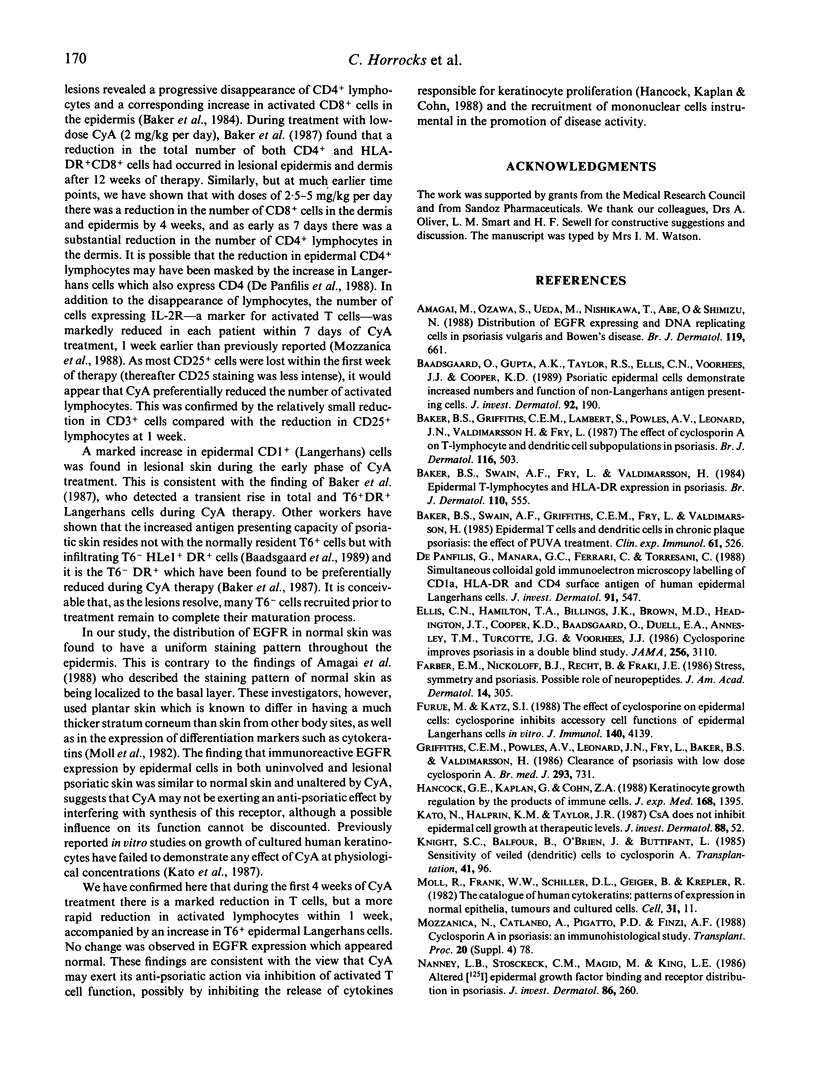

Images in this article
Selected References
These references are in PubMed. This may not be the complete list of references from this article.
- Amagai M., Ozawa S., Ueda M., Nishikawa T., Abe O., Shimizu N. Distribution of EGF receptor expressing and DNA replicating epidermal cells in psoriasis vulgaris and Bowen's disease. Br J Dermatol. 1988 Nov;119(5):661–668. doi: 10.1111/j.1365-2133.1988.tb03480.x. [DOI] [PubMed] [Google Scholar]
- Baadsgaard O., Gupta A. K., Taylor R. S., Ellis C. N., Voorhees J. J., Cooper K. D. Psoriatic epidermal cells demonstrate increased numbers and function of non-Langerhans antigen-presenting cells. J Invest Dermatol. 1989 Feb;92(2):190–195. doi: 10.1111/1523-1747.ep12276718. [DOI] [PubMed] [Google Scholar]
- Baker B. S., Griffiths C. E., Lambert S., Powles A. V., Leonard J. N., Valdimarsson H., Fry L. The effects of cyclosporin A on T lymphocyte and dendritic cell sub-populations in psoriasis. Br J Dermatol. 1987 Apr;116(4):503–510. doi: 10.1111/j.1365-2133.1987.tb05869.x. [DOI] [PubMed] [Google Scholar]
- Baker B. S., Swain A. F., Fry L., Valdimarsson H. Epidermal T lymphocytes and HLA-DR expression in psoriasis. Br J Dermatol. 1984 May;110(5):555–564. doi: 10.1111/j.1365-2133.1984.tb04678.x. [DOI] [PubMed] [Google Scholar]
- Baker B. S., Swain A. F., Griffiths C. E., Leonard J. N., Fry L., Valdimarsson H. Epidermal T lymphocytes and dendritic cells in chronic plaque psoriasis: the effects of PUVA treatment. Clin Exp Immunol. 1985 Sep;61(3):526–534. [PMC free article] [PubMed] [Google Scholar]
- De Panfilis G., Manara G. C., Ferrari C., Torresani C. Simultaneous colloidal gold immunoelectronmicroscopy labeling of CD1a, HLA-DR, and CD4 surface antigens of human epidermal Langerhans cells. J Invest Dermatol. 1988 Dec;91(6):547–552. doi: 10.1111/1523-1747.ep12476912. [DOI] [PubMed] [Google Scholar]
- Ellis C. N., Gorsulowsky D. C., Hamilton T. A., Billings J. K., Brown M. D., Headington J. T., Cooper K. D., Baadsgaard O., Duell E. A., Annesley T. M. Cyclosporine improves psoriasis in a double-blind study. JAMA. 1986 Dec 12;256(22):3110–3116. [PubMed] [Google Scholar]
- Farber E. M., Nickoloff B. J., Recht B., Fraki J. E. Stress, symmetry, and psoriasis: possible role of neuropeptides. J Am Acad Dermatol. 1986 Feb;14(2 Pt 1):305–311. doi: 10.1016/s0190-9622(86)70034-0. [DOI] [PubMed] [Google Scholar]
- Furue M., Katz S. I. The effect of cyclosporine on epidermal cells. I. Cyclosporine inhibits accessory cell functions of epidermal Langerhans cells in vitro. J Immunol. 1988 Jun 15;140(12):4139–4143. [PubMed] [Google Scholar]
- Griffiths C. E., Powles A. V., Leonard J. N., Fry L., Baker B. S., Valdimarsson H. Clearance of psoriasis with low dose cyclosporin. Br Med J (Clin Res Ed) 1986 Sep 20;293(6549):731–732. doi: 10.1136/bmj.293.6549.731. [DOI] [PMC free article] [PubMed] [Google Scholar]
- Hancock G. E., Kaplan G., Cohn Z. A. Keratinocyte growth regulation by the products of immune cells. J Exp Med. 1988 Oct 1;168(4):1395–1402. doi: 10.1084/jem.168.4.1395. [DOI] [PMC free article] [PubMed] [Google Scholar]
- Kato N., Halprin K. M., Taylor J. R. Cyclosporin A does not inhibit epidermal cell growth at therapeutic levels. J Invest Dermatol. 1987 Jan;88(1):52–54. doi: 10.1111/1523-1747.ep12465001. [DOI] [PubMed] [Google Scholar]
- Knight S. C., Balfour B., O'Brien J., Buttifant L. Sensitivity of veiled (dendritic) cells to cyclosporine. Transplantation. 1986 Jan;41(1):96–100. doi: 10.1097/00007890-198601000-00019. [DOI] [PubMed] [Google Scholar]
- Moll R., Franke W. W., Schiller D. L., Geiger B., Krepler R. The catalog of human cytokeratins: patterns of expression in normal epithelia, tumors and cultured cells. Cell. 1982 Nov;31(1):11–24. doi: 10.1016/0092-8674(82)90400-7. [DOI] [PubMed] [Google Scholar]
- Nanney L. B., Stoscheck C. M., Magid M., King L. E., Jr Altered [125I]epidermal growth factor binding and receptor distribution in psoriasis. J Invest Dermatol. 1986 Mar;86(3):260–265. doi: 10.1111/1523-1747.ep12285389. [DOI] [PubMed] [Google Scholar]
- Thomson A. W., Mathie I. H., Sewell H. F. Cyclophosphamide-induced eosinophilia in the rat: concomitant changes in T-cell subsets, B cells and large granular lymphocytes within lymphoid tissues. Immunology. 1987 Mar;60(3):383–388. [PMC free article] [PubMed] [Google Scholar]
- Thomson A. W., Webster L. M. The influence of cyclosporin A on cell-mediated immunity. Clin Exp Immunol. 1988 Mar;71(3):369–376. [PMC free article] [PubMed] [Google Scholar]
- Voorhees J. J. Leukotrienes and other lipoxygenase products in the pathogenesis and therapy of psoriasis and other dermatoses. Arch Dermatol. 1983 Jul;119(7):541–547. [PubMed] [Google Scholar]



